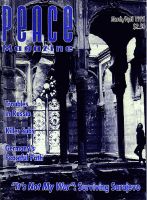
Peace Magazine Mar-Apr 1995, page 27. Some rights reserved.
Search for other articles by Brian Burch here
Pauletta J Otis; Steven H Caplan (editors) Colorado University Press 1994
If one reads a novel such as All Quiet on the Western Front, war is brought out in all its horror more effectively than a statistical breakdown on the casualties of war. Between the Lines is an anthology of short stories on the theme of war that brings the human cost forward in an effective, not overwhelming manner.
Between the Lines contains stories written by individuals from around the world. We can read the writing that comes from the experience of those in Israel and Palestine, from the United States and Vietnam, from Ireland and England, and from Russia and the Ukraine. Throughout the four the-matic sections--men and war; women and war; children and war; and death--the reader is confronted with the reality of suffering as experienced by individuals, not abstract depictions.
Between the Lines is a collection of well-crafted stories, all of which have appeared in print before. Some of the writers are well known to us, writers such as Chinua Achebe and George Bernard Shaw, while others, such as Knuts Lesines of Latvia and Ninotchka Rosca of the Philippines are better known in their own countries.
While the content of every story focuses on the violence and horror of war, none would be out of place in a traditional anthology of short fiction.
This collection will appeal to those outside the peace movement whose major concern is the quality of fiction, not what it reveals about the world in which we live.
The stories bring forward a spectrum of responses to war and the range of perspectives and understanding of men and women around the world and on different sides of military conflicts. From the corruption of a decent man to difficulties in the reintegration of a veteran, from the destruction of families to the impossibilities of developing lasting emotional relationships, both grand and routine aspects of war and life are explored with equal vividness.
Stories that examine racism, class issues, cultural diversity, and sexism in times of war form the core of this collection. Rape is dealt with only indirectly while environmental concerns are not mentioned.
Reading Between the Lines will leave one with both a greater appreciation of the effects of war on the lives of direct and indirect participants and a sense that healing and change are possible. Between the Lines is a collection thatadds hope for a better future for all.
Brian Burch is a Toronto-based writer, teacher and activist.

Peace Magazine Mar-Apr 1995, page 27. Some rights reserved.
Search for other articles by Brian Burch here